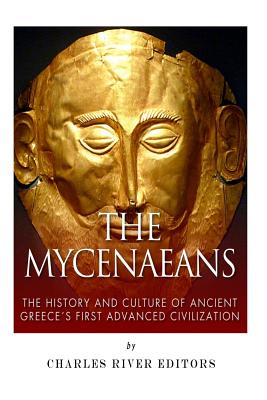The Mycenaeans: The History and Culture of Ancient Greece's First Advanced Civilization

The Mycenaeans: The History and Culture of Ancient Greece's First Advanced Civilization
*Includes pictures *Includes ancient accounts describing Mycenaean involvement in the Trojan War, trade, and other aspects of their history *Includes online resources and a bibliography for further reading *Includes a table of contents When people think of ancient Greece, images of philosophers such as Plato or Socrates often come to mind, as do great warriors like Pericles and Alexander the Great, but hundreds of years before Athens became a city, a Greek culture flourished and spread its tentacles throughout the western Mediterranean region via trade and warfare. Scholars have termed this pre-Classical Greek culture the Mycenaean culture, which existed from about 2000-1200 BCE, when Greece, along with much of the eastern Mediterranean, was thrust into a centuries long dark age. Before the Mycenaean culture collapsed, it was a vital part of the late Bronze Age Mediterranean system and stood on equal footing with some of the great powers of the region, such as the Egyptians and Hittites. Despite being ethnic Greeks and speaking a language that was the direct predecessor of classical Greek, the Mycenaeans had more in common with their neighbors from the island of Crete, who are known today as the Minoans. Due to their cultural affinities with the Minoans and the fact that they conquered Crete yet still carried on many Minoan traditions, the Mycenaeans are viewed by some scholars as the later torchbearers of a greater Aegean civilization, much the way the Romans carried on Hellenic civilization after the Greeks. Given that the Mycenaeans played such a vital role on the history in the late Bronze Age, it would be natural to assume there are countless studies and accurate chronologies on the subject, but the opposite is true. Although the Mycenaeans were literate, the corpus of written texts from the period is minimal, so modern scholars are left to use a variety of methods in order to reconstruct a proper history of Mycenaean culture. In fact, even the name "Mycenaean" can be a bit misleading since it refers only to one locale in Greece. However, since the city was the first Bronze Age site discovered, it became a reference point for archeologists and historians to use to refer to any Bronze Age discoveries in Greece. Archeology provides the base for any study of the ancient Mycenaeans; since many of their cities were replaced and built over in classical, medieval, and modern times, excavations of the Bronze Age cities can tell modern scholars how these p
PRP: 56.11 Lei
Acesta este Prețul Recomandat de Producător. Prețul de vânzare al produsului este afișat mai jos.
50.50Lei
50.50Lei
56.11 LeiLivrare in 2-4 saptamani
Descrierea produsului
*Includes pictures *Includes ancient accounts describing Mycenaean involvement in the Trojan War, trade, and other aspects of their history *Includes online resources and a bibliography for further reading *Includes a table of contents When people think of ancient Greece, images of philosophers such as Plato or Socrates often come to mind, as do great warriors like Pericles and Alexander the Great, but hundreds of years before Athens became a city, a Greek culture flourished and spread its tentacles throughout the western Mediterranean region via trade and warfare. Scholars have termed this pre-Classical Greek culture the Mycenaean culture, which existed from about 2000-1200 BCE, when Greece, along with much of the eastern Mediterranean, was thrust into a centuries long dark age. Before the Mycenaean culture collapsed, it was a vital part of the late Bronze Age Mediterranean system and stood on equal footing with some of the great powers of the region, such as the Egyptians and Hittites. Despite being ethnic Greeks and speaking a language that was the direct predecessor of classical Greek, the Mycenaeans had more in common with their neighbors from the island of Crete, who are known today as the Minoans. Due to their cultural affinities with the Minoans and the fact that they conquered Crete yet still carried on many Minoan traditions, the Mycenaeans are viewed by some scholars as the later torchbearers of a greater Aegean civilization, much the way the Romans carried on Hellenic civilization after the Greeks. Given that the Mycenaeans played such a vital role on the history in the late Bronze Age, it would be natural to assume there are countless studies and accurate chronologies on the subject, but the opposite is true. Although the Mycenaeans were literate, the corpus of written texts from the period is minimal, so modern scholars are left to use a variety of methods in order to reconstruct a proper history of Mycenaean culture. In fact, even the name "Mycenaean" can be a bit misleading since it refers only to one locale in Greece. However, since the city was the first Bronze Age site discovered, it became a reference point for archeologists and historians to use to refer to any Bronze Age discoveries in Greece. Archeology provides the base for any study of the ancient Mycenaeans; since many of their cities were replaced and built over in classical, medieval, and modern times, excavations of the Bronze Age cities can tell modern scholars how these p
Detaliile produsului











